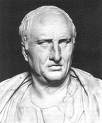Who was Cicero? Cicero (106-43 B.C) was the most fruitful Roman political theorist. He was a Roman Senator during the period of turmoil between the old Roman republic and the Empire. He is deemed to be the greatest Roman prose writer and a great orator. He often sprinkled his speeches with wit. Caesar had multiplied the number of Senators, thus diluting the power of the original group. But one of the new officials held office for only a day. “We have a consul of such vigilance that during his entire term he never slept a wink,” was Cicero’s wry comment. When chastised for failing to make the traditional courtesy call on the new consul, he added, “I was on my way, but night overtook me.” Another time he observed, “There is nothing so ridiculous but some philosopher has said it.”
Historical context. The death of the Roman republic marked also the death of its most ardent defender. During the 2nd Triumvirate (3 co-rulers), Cicero was sentenced to death and killed without trial at his home. Although discreet at first about pressing for a rebirth of the Republic, his hope had been renewed after the murder of the despot, Julius Caesar by Brutus. Brutus was an enemy pardoned by Caesar’s lenient policy of clementia. Cicero argued hotly against Marc Antony. Sadly, his own words condemned him. Antony, who became a member of the second Triumvirate, was more interested in personal power than restoring freedom. He is well-known for his later love affair with Cleopatra.
Summary of Cicero’s teaching. Most political errors that have come to bloom in the West sprouted in Greece. The thinking of Cicero was a prime example. Cicero made no claim to being first. He freely admitted that he was trying to order Greek thought and persuade Romans to adopt it. He borrowed his natural law theory and his faith in the nascent deity of man from Aristotle and Plato. His extant works include the Republic and the Laws.”Vox populi; vox dei” — “the voice of the people is the voice of god” — was another Cicero dictum. Cicero summed up the spirit of democracy with these stirring words. They have echoed down through the centuries to the present day. In spite of this he favored a mixed government. This contains elements of monarchy (rule of one), aristocracy (rule of a few) and of democracy (rule of all).
Implications for subsequent history. The drafters of the U.S. Constitution looked to republican Rome as a primary blueprint for the nation they were building. That included Thomas Jefferson in 1776 as well as the American framers in 1787. All were impressed with the moralistic, patriotic civil religion set forth by Cicero. “Civil religion” is religious ideals and worldview supposed to be held in common by a diverse people. It serves to unite them in a civil state. In Rome, this was morality apart from God. It valued religion only to the extent that it could bolster the state. In fact, the heart of this faith was devotion to the state, soon to be embodied in Caesar worship. The drafters of the American Constitution copied the Roman Senate. The also assumed Roman names in the debates, adopted Roman building design, and in effect copied the civil religion of the Pantheon. The Pantheon was the temple devoted to the entire group of Roman gods. The founding fathers were presenting at the very least a mixture of classical civic ideals with Christian morality. The latter is also present in some of the capitol architecture.
The American framers looked back to Cicero in setting up the locus of authority for their Constitution in “We the people.” The Constitution itself – not Bible law – was made the “supreme law of the land” (Art. VI, Sec. 2). In so doing they rejected the rule of God with whom earlier Americans had covenanted. The American civil religion evolved from this improper base of authority. Its mythos includes George Washington as the great national savior and Thomas Jefferson as the lawgiver. Abraham Lincoln is the latter day prophet of the Gettysburg Address. He called the nation back to its neglected roots in The Declaration.
Biblical analysis. Cicero was aware of the Bible faith, but rejected it as naive. Thus, his natural law theory fails to account for the Fall and the impact it had on the mind of man and on nature. Fallen nature can never be the standard for man (Rom. 8:21-23). Even if it were, man’s darkened mind is unable to interpret it apart from the Bible (Rom. 3:11). The history of Rome reveals that apart from the Law of God, natural law is helpless to prevent the decay of freedom and the growth of tyranny. Ironically, the letter of Paul to the Romans locates the source of civil authority in God alone (Rom. 13:1), not in the people.
Corrective or prescriptive actions. In the founding of governments, the “voice of the people” must be rejected in favor of the “voice of God.” The laws of nations must be based only on the Law of God, never on so-called natural law. The latter is subject to the whim of whoever happens to hold the reigns of power at the time.


